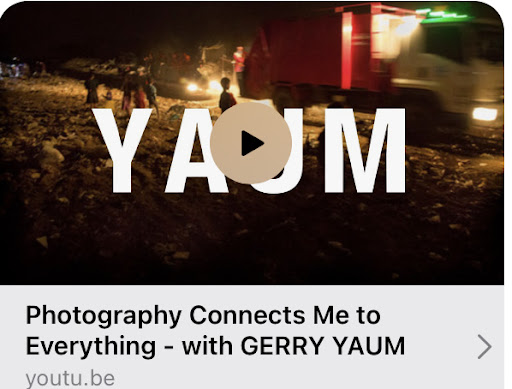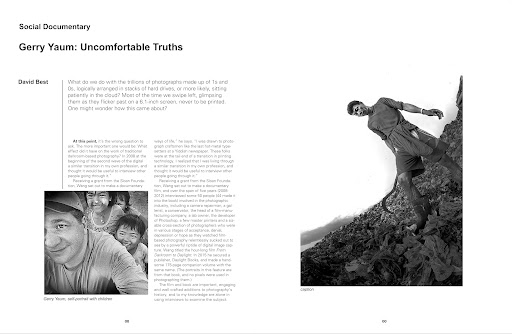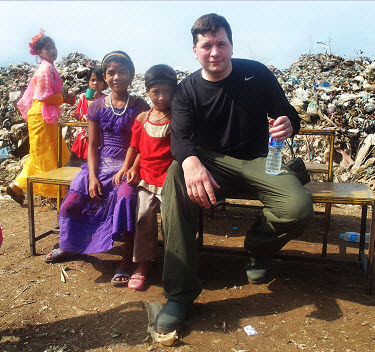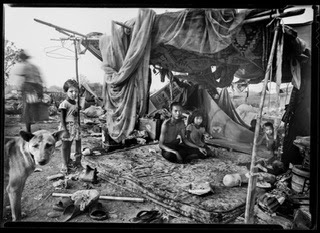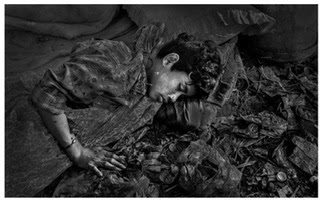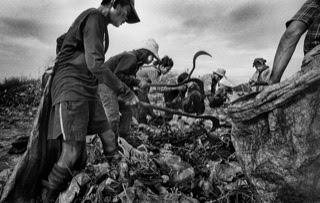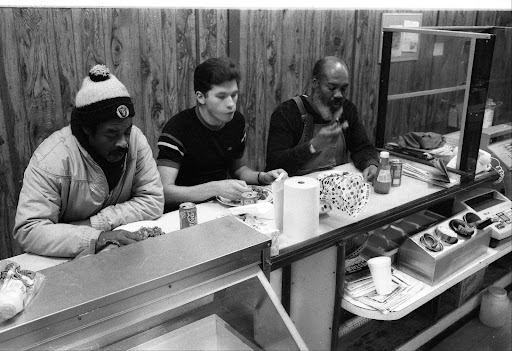Read this in the Bangkok Post while in Cambodia:
Nurturing OUR MIND for disasters
While we are all concerned with the floods and looming natural disasters, PHRA PAISARN VISALO points out the dangers of a wrecked mind, which can bring us more and greater damages than any disasters could. Here the scholar monk shares some guidelines to help us cultivate our mind to better cope with life's crises
There are many causes that lead to a wrecked mind. Aside from greed and selfishness, there is anger. In a face of anger and hatred, we can hurt those we love and are close to us. Husbands hit their wives. Children hurt their parents. Siblings are caught up in feuds with one another. And not to mention others, with a wrecked mind, we can even hurt ourselves. There were those who ended their lives because they felt neglected by their lovers. Some, feeling enraged, took their lives to avenge their parents. Despite a comfortable affluent life, many decided to die. For some cases, they may survive the deadly thoughts, but still the uncontrolled rage causes them to fall fatally ill. There have been people who suffer from strokes and become paralysed for life as a result.
Fear, too, can wreck our mind; and leads us to disastrous situations. Gripped by fear, we become terrified; the mind produces all kinds of thoughts which put us in sleepless nights and loss of appetite. Some people become panic-stricken after learning from a doctor that their prognosis of cancer is three months. Unable to accept their impending death, they became so anxious and so depressed that they cannot sleep or eat. Only twelve days later, they died an agonising death.
Succinctly put, our mind is wrecked because we are unaware of ourselves; our thoughts and feelings. We allow anger, greed and fear to take over and misdirect our mind, which in turn drives us to do anything, including hurting ourselves. On an impulse, some jump off a building, jump from a bridge or jump into the street to get run over by a car _ or get a gun to end their life as well as others.
Therefore, what we need to do in times of disaster is to compose ourselves. Do not fret or become so frightened by external dangers that we overlook the ever-greater danger that lies within. The mind, which should be the source of happiness, can turn into our worst and most fearful enemy. Remember, nothing hurts us more than our own mind, according to Lord Buddha; ''The misdirected mind brings about damages far greater than our enemies can do to us.
Enemies or those who hold grudges against each other do not cause as much harm as a mind that is misdirected and strayed from dharma. Or as I put it, a wrecked mind. Thieves may steal our precious belongings, but they cannot take away the happiness from our heart. Likewise, those who scold at us, no matter how hard and harsh their words are, cannot hurt us if we do not allow them to. But because our mind is misdirected and wrecked, then even a few trifling words can drive us into insanity and self affliction.
There were people who committed suicide after hearing undesirable remarks, though not ruthless. For instance, when a mother said to her child, ''I can't afford to get you a mobile phone'', or when a dad said, ''If you fail the exam, I'll cut you off from the family''. These words can get some people to end their lives. Are these words too belligerent? I do no think so. But because the mind of the listeners is misdirected, then anything detrimental can happen.
Therefore, maintaining the equilibrium of our mind is very important. If we learn to nurture our mind, then we will not be fearful or worrisome in the wake of disasters. Yet, this does not mean that we would be indolent, doing nothing. In times of disaster, we should be vigilant, making all preparations needed. However, in a fright-free manner.
We also should keep in mind that disasters are beyond our capacity to control or predict. Thus, we should be prepared to cope with them at all times; not only natural disasters, but also man-made calamities, such as a fire outbreak. Even if there are no present disasters, our mind, that is calm and poised, can help us face the natural courses of life, such as sickness, loss, and death.
These are some guidelines on how to take care of our mind.
Be constantly aware of our thoughts and feelings...
Do not let fear, anger and greed occupy our mind. When we hear the news or rumours about natural disasters and all the doomsday predictions, be very mindful. Do not be frightened. Scrutinise all the information to get to the truth; otherwise, we may fall prey to the rumours and be a part in disseminating untruthful news. We should persistently follow mindful awareness practices and incorporate these practices in our way of living. This way, our mind will become calm and firm, unwavering with any incidents that come into life.
Be in the present moment.
Do not be worried about the future or things that have not yet come. Being prepared for plausible danger is good, but if we are too obsessed with it, we could suffer from groundless fears. After we do our best for disaster preparation, we should then give our full attention to the present moment. Live in the moment and take joy in the things we have right now. Do not be too concerned with the future that we become restless and stressed. In doing so, we not only bury ourselves in misery but we also throw away the joy that exists in the moment.
Accept everything that has happened
There is no use in complaining, throwing a tantrum or denying incidents that have already happened. Doing so would not improve the situation; on the contrary, it exacerbates our suffering. What we should do is accept the situation and reflect on a way forward. How can we solve the problem? How can we reduce the damage?
Yet, when we do our best to alleviate the circumstances, we need to let go of the results and the loss that has occurred. Things can be lost, but we should not lose our minds. Remember that as long as we still can breathe, we can still regenerate our lives and earn things that have been lost.
Suffering does not stay with us forever, it will disappear one day.
Contemplate on death and dying
We all die ... and we can die at any moment; this is a truth we should always be aware of. Actually, death is close to life _ more than any disaster. Without natural disasters, we still die.
We never know when death will knock on our door; it could be today or later tonight. Then we should ask ourselves these questions ... if we were to die today, are we ready to leave this world? Have we done enough good merits in this lifetime? Have we finished all our important businesses? Are we ready to let go off everything _ our possessions, children, parents, lovers, including our physical body?
If we do not feel that we are ready, then, don't waste time. Treat others with care and constantly be aware that today could be our last day with our loved ones. Do not pass the chance to treat them well while we still can.
Be generous and kind.
The more obsessed we are with ourselves, the easily prone we are to suffer. But the other way around, when we think about those who suffer more than ourselves, our predicament becomes small and, thus, tolerable.
Take this story for example. Nine days after an earthquake, which was followed by a tsunami, in Japan earlier this year, a volunteer went to the hard-hit areas to distribute some provisions to the tsunami victims. That day, the queue was very long and the volunteer saw a nine-year-old boy at the end of the line.
He approached the boy and learned that the boy had lost his parents in the tidal waves. And all that he had left was the T-shirt and pair of shorts he was wearing. Determined to give his jacket to the boy, the volunteer took off his jacket. While he was doing this, the food packet he had kept for himself fell to the ground. He picked it up and also handed the packet to the boy.
The boy accepted the food, bowed and said thank you. But he did not eat the food. Instead, the boy walked towards the front of the line, placed the packet of food on the tray reserved for distribution, and walked back to the end of the queue.
To his amazement, the volunteer asked the boy the reason why he did not take the food for himself. The boy replied: ''There might be many more people who are hungrier than I am. I put the food there so that it can be fairly distributed to all.''
Undoubtedly, this boy was suffering, but he was kind and generous to others. Feeling empathy for others will enable us to be tolerable to our own plights.
If we allow our mind to be wrecked, it can harm us more than any person could. On the contrary, if we take good care of our mind, it will become our best and noblest friend. We would find happiness even in troubled waters and transform our miseries into bliss.
No one and nothing can give us such a noble gift but a mind that is fixed on the path of dharma. As Lord Buddha said: ''No mother, father, nor relatives can do this for us, but the mind, well trained, can deliver this to us''.
If we fix our mind on the path of dharma, we will discover the noblest things that our parents cannot make for us.
This great flood is another lesson that shows us the nature of impermanence. It is telling us that nothing genuinely belongs to us. One day, all that we have and possess will be gone. The more we cling on to them, the more suffering we will have. Additionally, take this as a warning from nature; the future would see more great disasters, both at a national and global level.
Is it true or not, that our loss today is still considered trivial when compared to the loss that will happen to us in the future, especially, when we are to leave this world? When that fateful day arrives, no matter how much we possess, we will lose them all, including our breath.
skip to main |
skip to sidebar
I have been thinking of why I love photography, it comes down to something I have labeled "The Three Joys"
1) Creativity
The first joy is simply creating the work. Everything about the making of photographs I love. The initial ideas, the writing on the blog, the preparation of equipment, the research into my subjects, figuring out what I want to communicate. The camera tech stuff like composition, lens selection, cameras, figuring exposure, taking the shot etc. The post darkroom work where you swim with your prints bringing them slowly to life, creating something powerful and beautiful. I love it all.
It is so powerful a thing, you have a idea in your mind, there is nothing else, then YOU make it, you create it, it's fricking awesome stuff.
2) The People
The second joy is that photography has allowed me a way into so many peoples lives, so many different worlds. I get to meet people of all types, speak to them, eat with them, cry and laugh with them. For a while I get to live their existence to be them if you will.
I get to be a child in a slum in Bangkok or a drug addict in a ghetto in Oakland. I get to be a ladyboy sex worker in Pattaya or a man dying of cancer in Canada. Of course I am not really those people but I get a true flavor for those worlds, those experiences, the good and the bad, the ugly and the beautiful, the joy and the sadness.
With photography I get a chance to live outside of the same same everyday meat and potato lives many of my friends and family live. Because I use a camera and make pictures all the doors to a wonderful life experience are open to me, photography is a window into everything!
3) The Photograph
The third joy is about the feeling you get when you accomplish your goals, when you see your final print in the developer, fix or hanging in a gallery. There is a special emotion there, a true satisfied happiness, something so uniquely rewarding. In the darkroom sometimes when I see the finished photo for the first time as it lays in the fixer tray I will let out hoops of joy. I will scream and shout. It is quite a spectacle! It's just the sheer high of that moment bursting out, the YES moment. When the photo is right and you see it for the first time it's the best feeling in the world, better than anything I have ever felt, the high of highs!!
"Ain't Photography Grand!"
"Ain't Photography Grand!!"
Social Documentary Photography for a Better World!
Search This Blog
Contact Gerry Yaum
contact@gerryyaum.net
Gerry Yaum Interview, FRAMES PHOTOGRAPHY MAGAZINE YouTube Channel
"Black & White" Photography Magazine, Issue #160
BLACK &WHITE Magazine, Layout Feature
CENTRE for BRITISH DOCUMENTARY PHOTOGRAPHY, CBDP
St. Albert Gazette MY FATHERS LAST DAYS Story
Me, W. Eugene Smith, Sebastiao Salgado, Lewis Hine and Walker Evans! :) NOT!!!
LUNCHBOX Radio Interview FOR UNB EXHIBITIONS
MONEY EARNED TO HELP THE PEOPLE IN THE PICTURES
Money that will be used to directly help the people in our two photography projects, THE FAMILIES OF THE DUM and THE PEOPLE WHO LIVE UNDER THE FREEWAY $6334.67 ($6000 earned when 6 prints were added to the UNB permanent collection).
GOFUNDME, FAMILES/FREEWAY
Trying to raise $2000 to help the people under the freeway, and the families of the dump. TOTAL RAISED SO FAR = $325 —->$314.67 (after GOFUNDME fees).
UNIVERSITY OF NEW BRUNSWICK EXHIBITIONS VIDEO
Analog Forever Magazine
Vernon Morning Star Newspaper Story
2022 "Families of the Dump"/The People Who Live Under The Freeway Donation Buys
Total donation money spent for the 2022 trip to the Mae Sot dump (THE FAMILIES OF THE DUMP), Bangkok's Klong Toey Slum (THE PEOPLE WHO LIVE UNDER THE FREEWAY). Money spent on "The Families of the Dump" = $571.17 CAD (14982 Thai Baht) Money spent on "The People Who Live Under The Freeway = $144 CAD (3849 Thai Baht) General cases where money was spent to help others in need $15 CAD (401baht)
(Thai Currency) or
CAD
"Families of the Dump" Donation Total
$4420.02 CAD
GERRY YAUM: YouTube Video PHOTOGRAPHY CHANNEL
THE GOAL
To create photographs that speak to the universality, the commonality and the shared humanity of all peoples, regardless of country, race, culture or language.
TRANSLATE YAUM'S PHOTO DIARY INTO YOUR LANGUAGE
Quote: Robert F. Kennedy
“The purpose of life is to contribute in some way to making things better.”
Quote: Nelson Mandela
"As long as poverty, injustice and gross inequality persist in our world, none of us can truly rest."
Quote: Weegee (Authur Fellig)
"Be original and develop your own style, but don't forget above anything and everything else...be human...think...feel. When you find yourself beginning to feel a bond between yourself and the people you photograph, when you laugh and cry with their laughter and tears, you will know your on the right track....Good luck."
Blog Archive
-
▼
2011
(552)
-
▼
December
(94)
- First 4x5 Film
- Development Of 35mm Continuing
- Freezing Tri-x
- Changing Back
- Quote: Paul Strand
- Quote: Sebastiao Salgado
- Breakfast With Salgado Story
- Quote: Sebastiao Salgado
- Kodak Out Of The Film Business?
- First Films Developed
- Quote: Billy Kwan
- Quote: Sebastiao Salgado
- Upcoming Shows
- Film Scrounger! And Changing Back To Being A Canuck
- First Ever Grant!
- First Edmonton 1 Man Show?
- Back In Edmonton!
- Thai Barbershop
- No Old People!
- 2nd Day Of Photographing Ladyboys
- Talked To Young Nid
- I Used To Work A Hotel
- Getting Mauled By Ladyboys
- More To Come
- Pattaya Farang The Zombie Stare
- Pattaya The Farang City
- Your Cold!!? Are You Kidding Me?
- Bags Bags And More Bags
- Gambling Next To A Slum
- Pulling Carts/Wagons Across The Border
- Cambodian Seller Honesty
- Got To Improve My Khmer
- Old Man In 70s Working Hard (Khmer Rouge Survivor ? )
- Kicking Game On Border
- Children Crying Or Curious
- Poipet One Big Slum Worse Than Klong Toey
- Children Living Next To Garbage Dumps
- No Hand Grenades Please
- I Have No Money, So Have No Wife
- Handing Out Money
- Quote: Dina Cambodia Border Immigration Policeman
- Higher Comfort Level
- People Here Much Poorer Than Thais
- Bolder And More Aggressive
- Acting Out Instead Of Speaking
- Nurturing Our Mind For Disasters
- Achilles Twist, Painfull Walking
- Skinny Kitten
- Wat Slum Children
- Wonderful Smiles
- Please Sit Down!! Have A Drink!!!
- Cart Pulling People
- Lying Visa Guys
- 100 Baht Visa Corruption Fee
- Hellos From Strangers
- In Poipet
- Back In Thai
- Going To Cambodia
- 3 Legged Crippled Dog
- Boredom
- Got To Make More Free Photos
- Banarama 2 Handheld No Flash
- Said Goodbyes
- Banarama 2 Working Flawlessly
- Muay Thai Gerry?
- Tomorrows Stuff
- Photographed At The Gym
- Taxi Time
- Michelangelo Buonarroti On Landscape Painting
- Quote: James Earl Jones (Actor)
- Photographed Nit
- Banarrama 2 Is Here!
- Khun Liang Ewe Exhibition At Kathmandu Gallery Ban...
- Money And More Money
- Banarama 2 At The Post Office
- Waun Poh
- Important Part Of The Process
- Khun Ot
- Todays Photo Work
- Quote: Manit Sriwanichpoom (Photographer)
- Khun Manit Sriwanichpoom, Kathmandu Gallery Bangkok
- Eagerly Waiting On The Banarama 2
- Todays Work And A Broken Tripod
- Taxi Talk
- Dim Sum For $4.50
- Here Have Some Water
- B2 On The Way
- Working Pen ^+#*?!
- Bag Of Fruit And 20 Baht A Kilo
- Oops I'm Going Back To My Room!
- On The Klong
- Future Razzle Camera Photographs?
- Try Again Tomorrow
- Xmas Songs
-
▼
December
(94)
Total Pageviews
The Three Joys Of Photography
The Three Joys
1) Creativity
The first joy is simply creating the work. Everything about the making of photographs I love. The initial ideas, the writing on the blog, the preparation of equipment, the research into my subjects, figuring out what I want to communicate. The camera tech stuff like composition, lens selection, cameras, figuring exposure, taking the shot etc. The post darkroom work where you swim with your prints bringing them slowly to life, creating something powerful and beautiful. I love it all.
It is so powerful a thing, you have a idea in your mind, there is nothing else, then YOU make it, you create it, it's fricking awesome stuff.
2) The People
The second joy is that photography has allowed me a way into so many peoples lives, so many different worlds. I get to meet people of all types, speak to them, eat with them, cry and laugh with them. For a while I get to live their existence to be them if you will.
I get to be a child in a slum in Bangkok or a drug addict in a ghetto in Oakland. I get to be a ladyboy sex worker in Pattaya or a man dying of cancer in Canada. Of course I am not really those people but I get a true flavor for those worlds, those experiences, the good and the bad, the ugly and the beautiful, the joy and the sadness.
With photography I get a chance to live outside of the same same everyday meat and potato lives many of my friends and family live. Because I use a camera and make pictures all the doors to a wonderful life experience are open to me, photography is a window into everything!
3) The Photograph
The third joy is about the feeling you get when you accomplish your goals, when you see your final print in the developer, fix or hanging in a gallery. There is a special emotion there, a true satisfied happiness, something so uniquely rewarding. In the darkroom sometimes when I see the finished photo for the first time as it lays in the fixer tray I will let out hoops of joy. I will scream and shout. It is quite a spectacle! It's just the sheer high of that moment bursting out, the YES moment. When the photo is right and you see it for the first time it's the best feeling in the world, better than anything I have ever felt, the high of highs!!
"Ain't Photography Grand!"
Contact Gerry
- Gerry Yaum
- Edmonton, Alberta, Canada
- Email Gerry: gerryyaum@gmail.com
"Can a photograph stop a war? Can it save a life? Can it lead to understanding, inspire someone to help, provide comfort and open the door to compassion?
Hope that it can.
Pray that it can."
Hope that it can.
Pray that it can."



